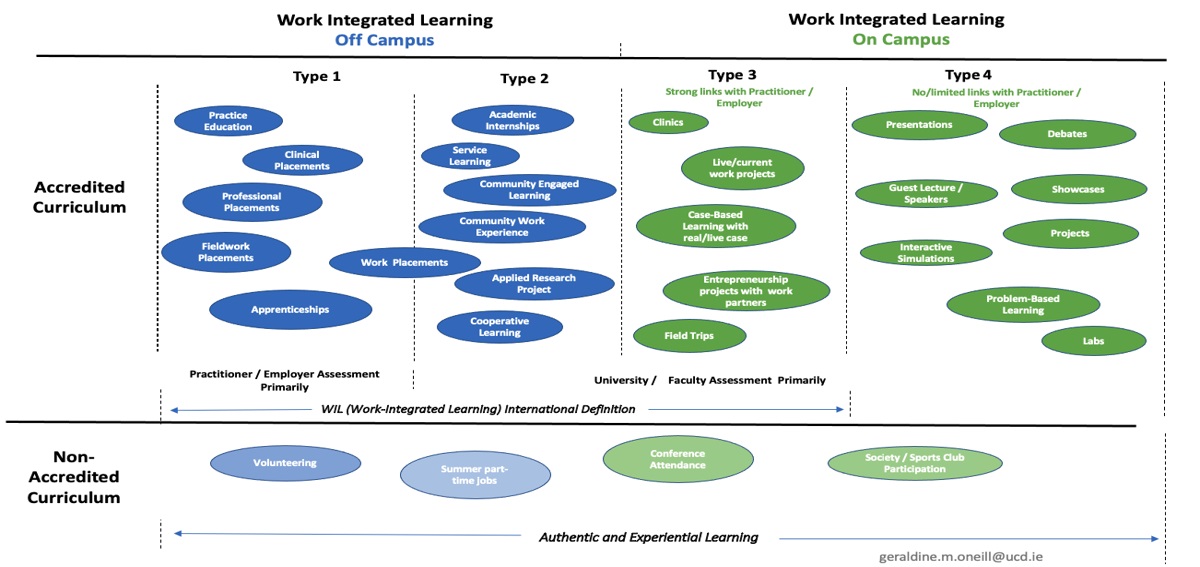Work-Integrated Learning
UCD, as in many institutions internationally, has a growing number of modules facilitating students going on placement/work experience off campus. Many professional programmes have been engaged in this activity since the onset of their programme, while many have developed experiences more recently. There is a growing international trend in describing the range of these experiences, which can also include some on-campus projects, under the umbrella term of ‘work-integrated learning (WIL)’ (Ferns et al, 2022). The emphasis on the word ‘integration’ highlights the importance of planning the integration of this experience with the other aspects of the students’ curriculum pre- and post this experience. Work-integrated learning experiences are also described as a spectrum of authentic learning experiences.
What is work-integrated learning?
WIL has been defined as "an educational approach that uses relevant work-based experiences to allow students to integrate theory with the meaningful practice of work as an intentional component of the curriculum. Defining elements of this educational approach require that students engage in authentic and meaningful work-related tasks, and must involve three stakeholders; the student, the university, and the workplace/community.(www.ijwil.org/)
Work-integrated learning, as defined by the international literature, is often divided therefore into three broad contexts; Types 1-3 below. To those three types we have added an additional context (Type 4) not included under WIL in other international definitions (Ferns et al, 2022; CEWIL, 2023), but useful to identify as a valuable experience in the spectrum of experiential or authentic learning in the accredited programme/curriculum. (See Figure 1):
- Type 1: Off-Campus Placement, that are primary assessed by practitioner (the staff on placement, the workplace/community ). For example, clinical practice/placement, clinics, fieldwork, professional practice/placement/work experience, apprenticeships, work placement, work-based learning.
- Type 2: Off-Campus Placements, that are primarily assessed by institutional (UCD) faculty/staff. For example, internships, co-operative learning (co-op), service learning, community work experience, community engaged learning, work-based learning, work placement, applied research projects, industrial research placement etc
- Type 3: On-Campus opportunities, that are primarily assessed by institutional (UCD) faculty/staff, but strongly linked and engaged with employers/practitioners/industry. For example, work-related projects, entrepreneurships, student-led enterprise, case/problem-based learning, clinics, etc
- Type 4: On-Campus opportunities that are only assessed by institutional (UCD) faculty/staff. These are experiences in the accredited programme that are perceived by students as more authentic than the more traditional forms of learning but have limited or once off connection with the work-place or work-place staff, i.e. in class case studies, field trips, interactive simulations, teaching labs, guest speakers.
Figure 1: Spectrum of Examples of Authentic and Experiential Learning Opportunities (including work-integrated learning)

WIL Type 3 provides an opportunity for the student to undertake a body of work on campus that is strongly linked with the work-place staff, i.e. a project, clinic, etc. These experiences can be beneficial when similar experiences cannot be facilitated off-campus e.g., remediation project or when there are challenges presented in the uptake/completion of an internship. It is acknowledged that these types of project based learning experiences, at times, can be more valuable than poor off-campus internships; notwithstanding that the University has greater control over these experiences.
In addition to the four types of ‘accredited’ authentic learning experiences, there can be opportunities for a suite of ‘experiential non-accredited’ learning, sometimes called extra or co-curricular experiences (CEWIL, 2023). These can be either on or off campus, such as volunteering, engagement in social /sport clubs, part-time work, students’ attending a conference, etc (see Figure 1). Whether on or off campus, accredited or non-accredited, all these activities can also be described as authentic learning opportunities (National Forum, 2017) or alternatively called experiential learning activities
References and Resources
- CEWIL Work Integrated Learning (Co-operative Education and Work-Integrated Learning Canada) (2023) https://cewilcanada.ca/CEWIL/CEWIL/About-Us/Work-Integrated-Learning.aspx
- Comparative Matrix of Co-operative Education with Other Forms of Work-Integrated Education and Work-Integrated Learning (2014) https://acewilbc.ca/wp-content/uploads/2017/07/ACCE_Matrix.pdf
- Ferns, S.J, Rowe, A.D., Zegwaard, K.E. (2022) Advances in Research, Theory and Practice in Work-Integrated Learning: Enhancing Employability for a Sustainable Future, ISBN 9780367897758, Routledge https://www.routledge.com/Advances-in-Research-Theory-and-Practice-in-Work-Integrated-Learning-Enhancing/Ferns-Rowe-Zegwaard/p/book/9780367897758
- National Forum (2017) Authentic Assessment in Higher Education, National Forum for the Enhancement of Teaching and Learning.
- Zegwaard, K.E. , Pretti, T.J., Rowe, A.D. (Eds) (2020) Defining Work Integrated Learning. International Journal of Work-Integrated Learning. https://www.ijwork-integrated learning.org/